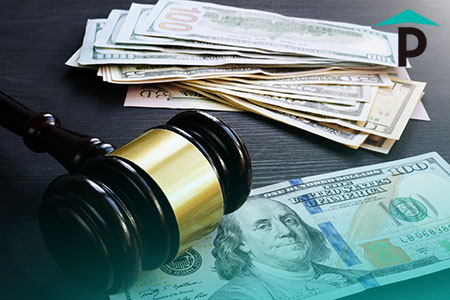Court bonds are bonds that are necessary in several court proceedings as a means of securing one’s costs and protecting them from financial loss. Judicial bonds and probate bonds are the two primary categories.
Call: (844) 612-7238
The former, judicial bonds are used when the litigant requests to have the costs of a special privilege secured before the final decision of the court has been made. As such, they’re used by the litigant to ensure the payment of losses that can happen as a result of rising costs caused by the court case, such as deprivation or delay, should the court rule in the favor of the other party.
Also see contract bonds and subdivision bonds provided by Pinnacle Surety.
Attachment Bond
This involves the seizure of assets from another party in order to ensure that the full amount of an expected judgment is secured against them. A writ of attachment is a document ordered by the court to approve the legal seizure of attachments and are ordered when the plaintiff is owed money or owns the property by the defendant. As such, they are only sought when the plaintiff expects a ruling in their favor.
Court Cost Bonds
 These bonds are used in order to ensure the payment of the expenses involved in litigation. These include payment for the clerk and sheriff, the court fees, as well the costs awarded against the party posting the bond.
These bonds are used in order to ensure the payment of the expenses involved in litigation. These include payment for the clerk and sheriff, the court fees, as well the costs awarded against the party posting the bond.
Injunction Bond
Injunctions are sought by one party when they require a court order to stop the other from an action that is violating or threatening to violate their legal rights. As such, these bonds are often required to reimburse the person if the injunction is not accepted by the court.
Appeal bonds
These are also called supersedeas bonds and are a surety bond that the court will require from appellants seeking to delay payment of a judgment until the end of the appeal process. With an appeal bond, the payment resulting from a judgment is secured. This also includes interest and additional costs that the appeal process involved. These bonds are underwritten and, as a result, necessitate collateral up to the full penal total of the bond.
Indemnity to Sheriff Bond
When law enforcement legally seizes property from the defendant as part of a court case, surety bonds may be necessary. This bond offers coverage for damages the defendant may seek in their own suit against the law enforcement agency as a result of the seizure.
Replevin Bond
These bonds are taken as a result of personal property that is seized or detained unlawfully. They are a legal action that are required by the court for the litigant and ensure the full payment of any costs that can happen as a result of the proceedings, such as deprivation and delay.

Restraining Order/Temporary Restraining Order Bond
If a defendant incurs a loss as a result of an award in their favor which ends a restraining order and concludes it should not have been granted, this is an injunction bond designed to cover any costs they may have suffered as a result of the restraining order.
Writ Bond
When the court mandates that a person or party stop performing a particular action until the conclusion of the legal proceedings, they may issue a writ stating so. This bond covers any damages that ceasing the action might have cost the party if the court eventually rules in their favor.
All of the bonds above are required as a result of civil court proceedings that guarantee coverage if the opposing party in the case suffers damages as a result of a special privilege or remedy that is sought in the advance of the proceedings. If that privilege was found to not be justified and ends up ruling in favor of the opposing party, judicial bonds ensure that the costs of making them whole are covered.
Differences between judiciary bonds and probate bonds
Besides judiciary bonds, there is also a category of court bonds known as probate bonds. Judiciary bonds are essential for those parties requesting a special privilege, in order to ensure the coverage for another individual’s loss or damages should the proceedings go in their favor. Probate bonds, on the other hand, are required if a party has been ordered by the court to care for the assets of another individual. They ensure that the duties stated by the court are performed faithfully and include bonds such as the following:

- Administrator bonds
- Executor bonds
- Personal representative bonds
- Guardianship bonds
- Trustee bonds
- Conservatorship bonds
Besides judicial bonds, Pinnacle Surety also provides a range of probate bonds for clients, which you can find more information on by getting in touch.
Getting bonded
If you require a judiciary or probate bond, then you need the help of a surety bond company with whom you can apply for one. When you request to apply for a bond, the company, such as Pinnacle Surety, will complete an evaluation on your character, history, and moral to ensure that you are trustworthy and can be responsible for it.
When the application process is complete, and you are approved for a bond, you are required to purchase it before it is issued. However, paying for the full bond amount is not always necessary. Instead, you may just have to pay the bond premium, which is just the first portion of a bond, enough to secure its issuance. For some judicial bonds, collateral may be required to secure the full amount of the bond, however.
Getting your judiciary bonds with Pinnacle Surety
At Pinnacle Surety, we have over 20 years of experience in helping clients the judiciary bonds, court bonds, and surety bonds they need. If you need to find out more details about any kinds of bonds in particular or you need help through the process of application, don’t hesitate to get in touch and we help you learn more and get the process started.
We provide a free quote with the quick survey tool we offer online, so you can get an accurate idea of how much you may have to pay to secure the bond premium. Otherwise, call us at 844 612-7238 and let us know what you need.


